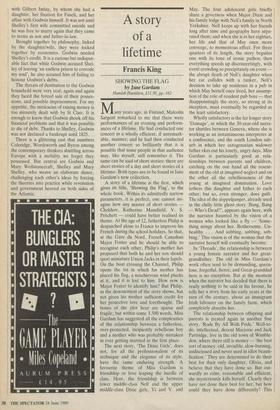A story of a lifetime
Francis King
SHOWING THE FLAG by Jane Gardam
Hamish Hamilton, £11 .95, pp. 162
Many years ago, in Finland, Malcolm Sargent remarked to me that there were performances of an evening and perform- ances of a lifetime. He had conducted one concert in a wholly efficient, if unremark- able, manner; and he had then conducted another concert so brilliantly that it is possible that some people in that audience may, like myself, still remember it. The same can be said of short stories: there are short stories of a day and short stories of a lifetime. Both types are to be found in Jane Gardam's new collection.
A story of a lifetime is the first, which gives its title, 'Showing the Flag', to the whole book. Within its admittedly narrow parameters, it is perfect; one cannot im- agine how any master of short stories — Chekhov, Katherine Mansfield, V. S. Pritchett — could have better realised its theme. At the age of 12, fatherless Philip is despatched alone to France to improve his French during the school holidays. So that, at the Gare du Nord, French Canadian Major Foster and he should be able to recognise each other, Philip's mother has proposed that both he and her son should sport miniature Union Jacks in their lapels. On the boat crossing the Channel, Philip opens the tin in which his mother has placed his flag, a mischievous wind plucks at it, and it is lost to him. How now is Major Foster to identify him? But Philip, as the denouement of the story shows, has not given his mother sufficient credit for her protective love and forethought. The bones of the plot here are sparse and fragile; but within some 3,500 words, Miss Gardam has suggested all the complexities of the relationship between a fatherless, over-protected, incipiently rebellious boy and a mother who was probably mistaken in ever getting married in the first place.
The next story, 'The Dixie Girls', does not, for all the professionalism of its technique and the elegance of its style, have the same enduring strength. A favourite theme of Miss Gardam is friendship or love leaping the hurdle of class. Here, the friendship is between lower middle-class Nell and the upper middle-class Dixie girls, Vi and V. and May. The four adolescent girls briefly share a governess when Major Dixie and his family lodge with Nell's family in North Yorkshire. Nell keeps up with her friends long after time and geography have sepa- rated them; and when she is in her eighties, her life and that of May once more converge, to momentous effect. For three quarters of its length, the story beguiles one with its tone of ironic pathos; then everything speeds up disconcertingly, with event crowding so precipitately on event the abrupt death of Nell's daughter when her car collides with a tanker, Nell's decision to take up residence in a pub in which May herself once lived, her assump- tion of the role of resident pub bore — that disappointingly the story, so strong at its inception, must eventually be regarded as the least satisfactory.
Wholly satisfactory is the far longer story `Damage', in which the 30-year-old narra- tor shuttles between Geneva, where she is working as an instantaneous interpreter at a conference, and the south London sub- urb in which her octogenarian widower father ekes out his lonely, angry days. Miss Gardam is particularly good at rela- tionships between parents and children, catching on the one hand all the resent- ment of the old at imagined neglect and on the other all the rebelliousness of the young at imagined domination. Love tethers this daughter and father to each other; but so, even stronger, does guilt. The idea of the doppelganger, already used in the chilly little ghost story 'Bang, Bang — Who's Dead?', appears again here, with the narrator haunted by the vision of a woman who looked like a fly — 'Some- thing mingy about her. Bothersome. Un- healthy . . . And sobbing, sobbing, sob- bing.' This vision is of the woman that the narrator herself will eventually become.
In 'Threads', the relationship is between a young female narrator and her great- grandfather. The old in Miss Gardam's work often tend to be demanding, queru- lous, forgetful, fierce; and Great-granddad here is no exception. But at the moment when the narrator has decided that there is really nothing to be said in his favour, he tells her a story from his early years at the turn of the century, about an immigrant Irish labourer on the family farm, which completely absorbs her.
The relationship between offspring and parents is, treated again in another fine story, 'Rode By All With Pride.' Well-to- do, intellectual, decent Marjorie and Jack Partridge, live in the old town of Wimble- don, where there still is money — 'the best sort of money: old, invisible, slow-burning, undiscussed and never used in idiot beauti- fication.' They are determined to do their best for their only daughter, Olivia, and believe that they have done so. But out- wardly so calm, reasonable and efficient, she mysteriously kills herself. Clearly they have not done their best for her; but how could they have done differently? This introduces another of Miss Gardam's themes: the stultifying and even destruc- tive effect of too much prosperity, order and ease on human personality.
As I have indicated, not all these stories show the same depth, although all show the same accomplishment and readability; but at least four of the ten would be outstanding in any company, however au- gust.











































































 Previous page
Previous page